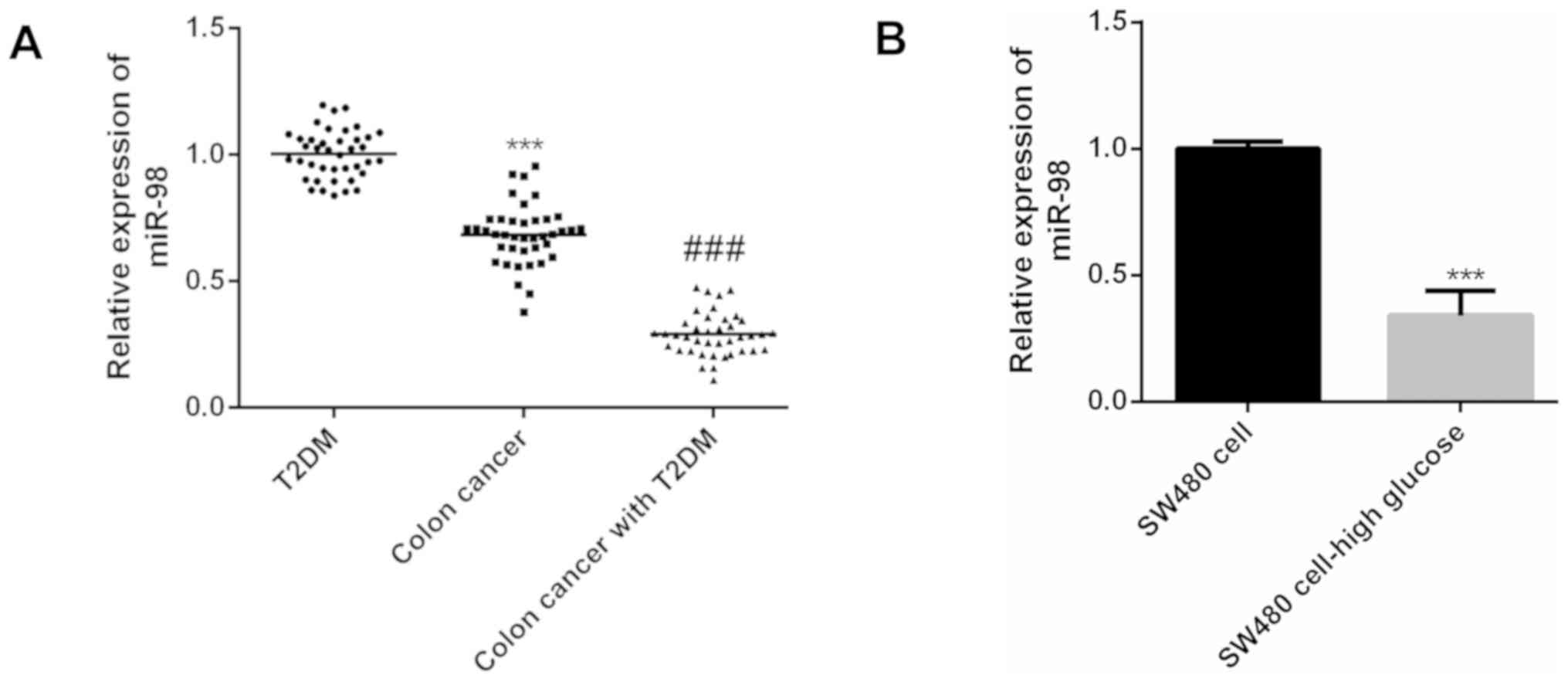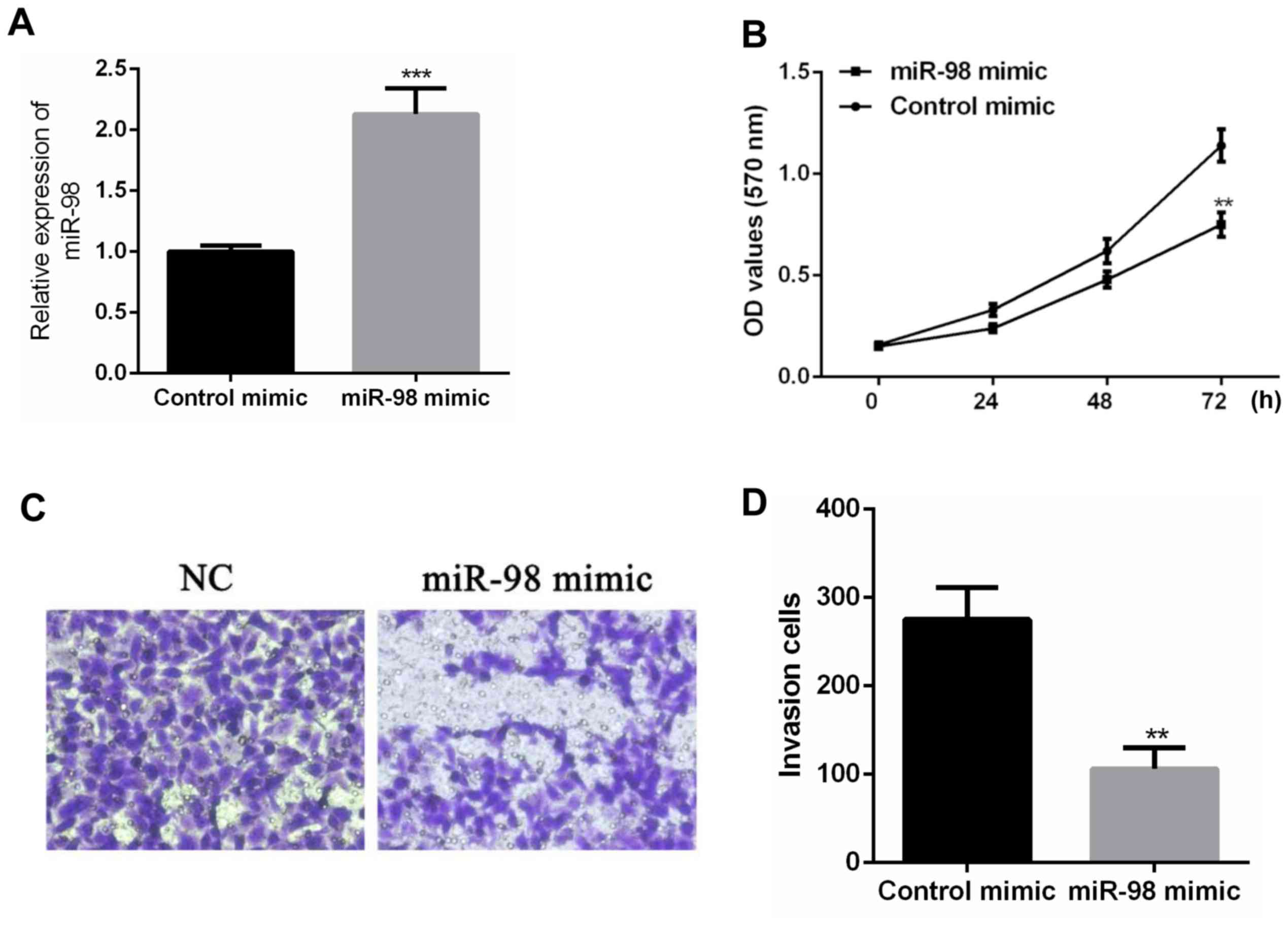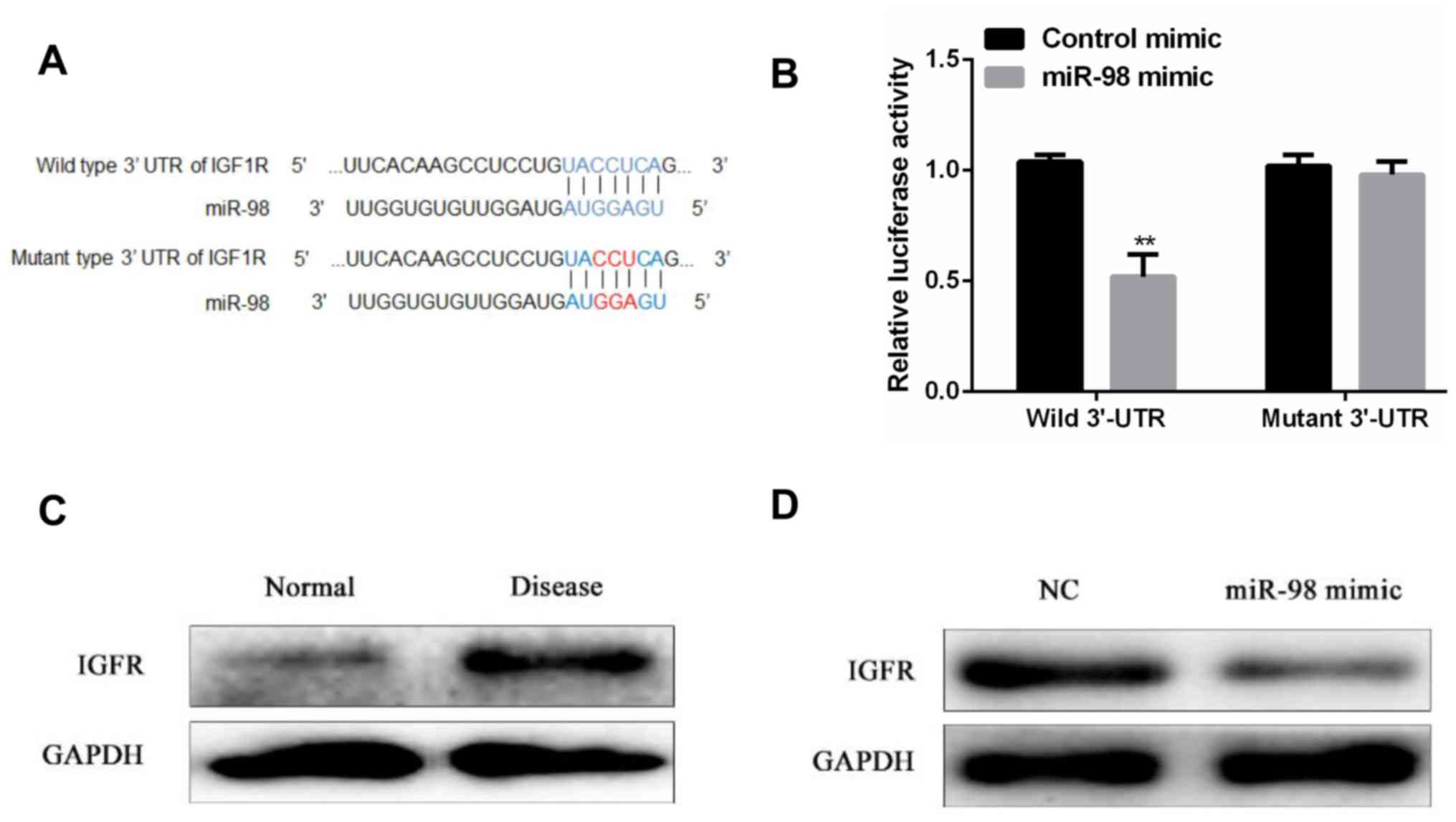|
1
|
Peng YC, Lin CL, Hsu WY, Chang CS, Yeh HZ,
Liao SC and Kao CH: The risk of colorectal cancer is related to
frequent hospitalization of IBD in an Asian population: results
from a nationwide study. QJM. 108:457–463. 2015. View Article : Google Scholar : PubMed/NCBI
|
|
2
|
Belov L, Zhou J and Christopherson RI:
Colorectal cancer thera-peutic antibodies. Encyclopedia of Cancer.
Schwab M: Springer. (Berlin, Heidelberg). 944–948. 2014.PubMed/NCBI
|
|
3
|
Ling H, Pickard K, Ivan C, Isella C, Ikuo
M, Mitter R, Spizzo R, Bullock M, Braicu C, Pileczki V, et al: The
clinical and biological significance of miR-224 expression in
colorectal cancer metastasis. Gut. 65:977–989. 2016. View Article : Google Scholar : PubMed/NCBI
|
|
4
|
Dienstmann R, Vermeulen L, Guinney J,
Kopetz S, Tejpar S and Tabernero J: Consensus molecular subtypes
and the evolution of precision medicine in colorectal cancer. Nat
Rev Cancer. 17:79–92. 2017. View Article : Google Scholar : PubMed/NCBI
|
|
5
|
Al Omari A, Abdelkhaleq H, Al-Hussaini M,
Turfa R, Awad N, Hassan MM, Alfaqih MA and Garrett CR: Validation
of the survival benefits of metformin in middle Eastern patients
with type II diabetes mellitus and colorectal cancer. J Glob Oncol.
4:1–10. 2018. View Article : Google Scholar
|
|
6
|
Park JW, Lee JH, Park YH, Park SJ, Cheon
JH, Kim WH and Kim TI: Sex-dependent difference in the effect of
metformin on colorectal cancer-specific mortality of diabetic
colorectal cancer patients. World J Gastroenterol. 23:5196–5205.
2017. View Article : Google Scholar : PubMed/NCBI
|
|
7
|
Nakayama Y, Iijima T, Wakaume R, Takahashi
K, Matsumoto H, Nakano D, Miyaki M and Yamaguchi T: Microsatellite
instability is inversely associated with type 2 diabetes mellitus
in colorectal cancer. PLoS One. 14:e02155132019. View Article : Google Scholar : PubMed/NCBI
|
|
8
|
Meyerhardt JA, Catalano PJ, Haller DG,
Mayer RJ, Macdonald JS, Benson AB III and Fuchs CS: Impact of
diabetes mellitus on outcomes in patients with colon cancer. J Clin
Oncol. 21:433–440. 2003. View Article : Google Scholar : PubMed/NCBI
|
|
9
|
Berster JM and Göke B: Type 2 diabetes
mellitus as risk factor for colorectal cancer. Arch Physiol
Biochem. 114:84–98. 2008. View Article : Google Scholar : PubMed/NCBI
|
|
10
|
Jin T: Why diabetes patients are more
prone to the development of colon cancer? Med Hypotheses.
71:241–244. 2008. View Article : Google Scholar : PubMed/NCBI
|
|
11
|
Wu YZ, Chan KYY, Leung KT, Lam HS, Tam YH,
Lee KH, Li K and Ng PC: Dysregulation of miR-431 and target gene
FOXA1 in intestinal tissues of infants with necrotizing
enterocolitis. FASEB J. 33:5143–5152. 2019. View Article : Google Scholar : PubMed/NCBI
|
|
12
|
Shen B, Han S, Wang Y, Yang Z, Zou Z, Liu
J, Zhao Z, Wu R and Wang C: Bta-miR-152 affects intracellular
triglyceride content by targeting the UCP3 gene. J Anim Physiol
Anim Nutr (Berl). 103:1365–1373. 2019. View Article : Google Scholar : PubMed/NCBI
|
|
13
|
Zhang X, Zhang M, Guo Q, Hu X, Zhao Z, Ni
L, Liu L, Wang X, Wang Z, Tong D, et al: MicroRNA-1297 inhibits
proliferation and promotes apoptosis in gastric cancer cells by
downregulating CDC6 expression. Anticancer Drugs. 30:803–811. 2019.
View Article : Google Scholar : PubMed/NCBI
|
|
14
|
Ghaemi Z, Soltani BM and Mowla SJ:
MicroRNA-326 functions as a tumor suppressor in breast cancer by
targeting ErbB/PI3K signaling pathway. Front Oncol. 9:6532019.
View Article : Google Scholar : PubMed/NCBI
|
|
15
|
Yun Z, Meng F, Jiang P, Yue M and Li S:
microRNA-548b suppresses aggressive phenotypes of hepatocellular
carcinoma by directly targeting high-mobility group box 1 mRNA.
Cancer Manag Res. 11:5821–5834. 2019. View Article : Google Scholar : PubMed/NCBI
|
|
16
|
Liu J, Huang Y, Cheng Q, Wang J, Zuo J,
Liang Y and Yuan G: miR-1-3p suppresses the epithelial-mesenchymal
transition property in renal cell cancer by downregulating
Fibronectin 1. Cancer Manag Res. 11:5573–5587. 2019. View Article : Google Scholar : PubMed/NCBI
|
|
17
|
Wang X, An D, Liu X, Wang X and Li B:
MicroRNA-27a downregulates the expression of Hsp90 and enhances the
radiosensitivity in esophageal squamous cell carcinoma. OncoTargets
Ther. 12:5967–5977. 2019. View Article : Google Scholar : PubMed/NCBI
|
|
18
|
Zhu W, Luo X, Fu H, Liu L, Sun P and Wang
Z: miR-3653 inhibits the metastasis and epithelial-mesenchymal
transition of colon cancer by targeting Zeb2. Pathol Res Pract.
215:1525772019. View Article : Google Scholar : PubMed/NCBI
|
|
19
|
Chai B, Guo Y, Cui X, Liu J, Suo Y, Dou Z
and Li N: miR-223-3p promotes the proliferation, invasion and
migration of colon cancer cells by negative regulating PRDM1. Am J
Transl Res. 11:4516–4523. 2019.PubMed/NCBI
|
|
20
|
Jin Y, Cheng H, Cao J and Shen W: MicroRNA
32 promotes cell proliferation, migration, and suppresses apoptosis
in colon cancer cells by targeting OTU domain containing 3. J Cell
Biochem. 120:18629–18639. 2019. View Article : Google Scholar : PubMed/NCBI
|
|
21
|
Shi XY, Wang H, Wang W and Gu YH:
miR-98-5p regulates proliferation and metastasis of MCF-7 breast
cancer cells by targeting Gab2. Eur Rev Med Pharmacol Sci.
23:2847–2855. 2019.PubMed/NCBI
|
|
22
|
Tan H, Zhu G, She L, Wei M, Wang Y, Pi L,
Chen C, Zhang D, Tan P, Chen J, et al: miR-98 inhibits malignant
progression via targeting MTDH in squamous cell carcinoma of the
head and neck. Am J Cancer Res. 7:2554–2565. 2017.PubMed/NCBI
|
|
23
|
Zhu W, Huang Y, Pan Q, Xiang P, Xie N and
Yu H: MicroRNA-98 suppress Warburg effect by targeting HK2 in colon
cancer cells. Dig Dis Sci. 62:660–668. 2017. View Article : Google Scholar : PubMed/NCBI
|
|
24
|
Del Puerto-Nevado L, Minguez P, Corton M,
Solanes-Casado S, Prieto I, Mas S, Sanz AB, Gonzalez-Alonso P,
Villaverde C, Portal-Nuñez S, et al Diabetes Cancer Connect
Consortium, : Molecular evidence of field cancerization initiated
by diabetes in colon cancer patients. Mol Oncol. 13:857–872. 2019.
View Article : Google Scholar : PubMed/NCBI
|
|
25
|
Wang L, Bai YY, Yang Y, Hu F, Wang Y, Yu
Z, Cheng Z and Zhou J: Diabetes mellitus stimulates pancreatic
cancer growth and epithelial-mesenchymal transition-mediated
metastasis via a p38 MAPK pathway. Oncotarget. 7:38539–38550. 2016.
View Article : Google Scholar : PubMed/NCBI
|
|
26
|
Wang K, Dong L, Fang Q, Xia H and Hou X:
Low serum miR-98 as an unfavorable prognostic biomarker in patients
with non-small cell lung cancer. Cancer Biomark. 20:283–288. 2017.
View Article : Google Scholar : PubMed/NCBI
|
|
27
|
Zhou H, Huang Z, Chen X and Chen S: miR-98
inhibits expression of TWIST to prevent progression of non-small
cell lung cancers. Biomed Pharmacother. 89:1453–1461. 2017.
View Article : Google Scholar : PubMed/NCBI
|
|
28
|
Zhu M, Zhang C, Chen D, Chen S and Zheng
H: MicroRNA-98-HMGA2-POSTN signal pathway reverses
epithelial-to-mesenchymal transition in laryngeal squamous cell
carcinoma. Biomed Pharmacother. 117:1089982019. View Article : Google Scholar : PubMed/NCBI
|
|
29
|
Li W, Wang J, Zhang D, Zhang X, Xu J and
Zhao L: MicroRNA-98 targets HMGA2 to inhibit the development of
retinoblastoma through mediating Wnt/β-catenin pathway. Cancer
Biomark. 25:79–88. 2019. View Article : Google Scholar : PubMed/NCBI
|
|
30
|
Acunzo M, Romano G, Wernicke D and Croce
CM: MicroRNA and cancer - a brief overview. Adv Biol Regul. 57:1–9.
2015. View Article : Google Scholar : PubMed/NCBI
|
|
31
|
Liu J, Bian T, Feng J, Qian L, Zhang J,
Jiang D, Zhang Q, Li X, Liu Y and Shi J: miR-335 inhibited cell
proliferation of lung cancer cells by target Tra2β. Cancer Sci.
109:289–296. 2018. View Article : Google Scholar : PubMed/NCBI
|
|
32
|
Ma L, Chen X, Li C, Cheng R, Gao Z, Meng
X, Sun C, Liang C and Liu Y: miR-129-5p and −3p co-target WWP1 to
suppress gastric cancer proliferation and migration. J Cell
Biochem. Nov 11–2018.(Epub ahead of print). doi:
10.1002/jcb.28027.
|
|
33
|
Kumar AS, Rayala SK and Venkatraman G:
Targeting IGF1R pathway in cancer with microRNAs: How close are we?
RNA Biol. 15:320–326. 2018. View Article : Google Scholar : PubMed/NCBI
|


















